Reviews
Ying Xiong Wei Lei
John Woo
Hong Kong, 1986
Credits
Review by Leo Goldsmith
Posted on 23 July 2012
Source bootleg DVD
Categories John Woo’s Hong Kong
John Woo is frequently credited with reinventing Hong Kong cinema thanks to his distinctive, bombastic take on the action genre, but the roots of his career lie firmly within the traditions of the HK studio industry. Before the enormous breakout success of his 1986 film A Better Tomorrow, Woo worked his way up from production assistant at Cathay Studios and Shaw Brothers to assistant director under master kung-fu director Chang Cheh before he turned to directing. His first film, the independently produced martial-arts film Young Dragons, soon gave way to a contract with the legendary Golden Harvest Productions, where he directed over a dozen films: some martial-arts films and Cantonese operas, but mainly comedies. Still, the only film from this early period that Woo lays claim to - indeed, the one he identifies as his “first real film” - is Heroes Shed No Tears, which broke a string of mild, low-budget farces and gave him the confidence in the action genre that he needed. While it’s by no means as assured a film as those that immediately followed it, it nonetheless exhibits Woo’s exultant approach to richly choreographed violence and honor among men.
The film’s plot is a threadbare contrivance, but it gets the job done. Somewhere in the jungles of the Golden Triangle, which straddles the borders of Thailand, Laos, Burma, and Vietnam, a corrupt, drug-running general lurks, plying his evil trade with an army of expendable guards. Somewhere nearby, a small group of mercenaries led by bad-ass family man Chan Chung (played by the steely-eyed Eddie Ko) prepares to attack. Hired to infiltrate the drugrunners’ camp and bring their nefarious leader back to Hong Kong alive to face justice, the mercenaries suit up with an array of machine guns, bombs, mines, and flamethrowers, which Woo’s camera ogles with the lascivious eyes of a twelve-year-old gun-freak. Soon, after a wealth of voluptuous, slow-motion detonations and blithe pile-up of a couple of dozen corpses, the mercenaries are underway, having kidnapped the big boss with Chinese finger traps and a gun to the head, and fleeing headlong into the jungle, with the bad guys in hot pursuit. As if this weren’t enough, our tearless heroes soon happen upon a cadre of vicious, communist Vietnamese border guards, from whom they must save a French journalist before she’s raped and killed (not necessarily in that order).
As in many of Woo’s films - and in spite of its dudeish title - Heroes Shed No Tears is driven by a kind of unspoken sentimental heroism, realized in the chivalrous intervention on behalf of the journalist, but mainly personified two characters: Julie, the sister of Chan Chung’s dead wife, and his little son, Kenny. The precise reason for their presence in the film is a little mystifying - it seems they live nearby? - and while they help to round out the story, they invariably get in the way. Kenny, in particular, poses various problems: he frequently sheds tears and occasionally endangers skin-of-the-teeth getaways by needing to pee. (Later, he comes through, proving himself a pretty nifty stuntboy, a passable triage nurse, and a quick study when it comes to explosives.) Their primary role in the film is to engender sympathy for Chan, who wants nothing more than to protect them and use his mercenary spoils to spirit them off to a better life in America, far from drugs and guns and mindless brutality. His spirit of self-sacrifice, a crucial trait for any Woo hero, is never more boldly on display than when he is saving Kenny from any number of abductions or not-so-certain deaths.
Their increasingly implausible survival amid all of the film’s increasingly elaborate carnage forms the structure upon Woo hangs his set-pieces: bloody, slo-mo punches to the face, instances of brutal misogyny, assorted amputations, and many, many explosions, all choreographed to a quasi-Baroque score. There is an unbelievable amount of shooting, much of it from an unpleasantly short range: several times to the head, once to the butt. The run-in with the border guards culminates in the kind of ornately violent gesture we would expect from Woo’s heyday: in a point-of-view shot through the crosshairs of a rifle about to gun some innocent down, Chan Chung unexpectedly appears and fires off a round—through the rifle sight and into the eye of the shooter.
This is the vengeful, now one-eyed colonel who remains on the trail of the mercenaries for the rest of the film, subsisting on in-the-field injections of morphine, coaxing the headhunting savages with painted faces to hunt down his prey, and doing devilish things like kidnapping Kenny, trapping him in a ring of fire, and then driving away laughing assuming the boy is done for. He isn’t—in a trick lifted from Lone Wolf and Cub, the boy digs under the earth to protect himself. While much of this strains credibility, little is as unlikely as the scene in which the group chances upon Chan’s old army pal Louis, an American he knew in some war who’s now chillin’ in a hut with lots of girls, some weed, and several grenades strapped to his chest. Here, the mercenaries take refuge before the final confrontation, in which the rapidly dwindling parties of drug-runners, mercenaries, and even a tribe of headhunting savages engage in an explosive confrontation with more bullets - if it can be believed - than the ending of The Killer.
More bullets, but perhaps a slightly less assured command of spatial logic. Indeed, while Heroes Shed No Tears successfully paves Woo’s entry in the modern action genre, it still lacks many of the distinctive traits of his best work. Some anomalies - like the terrible grass-hut bubble-bath sex scene which the studio added very much to the chagrin of the devoutly Christian Woo - are more interesting for this reason, but the film remains enthralled to a certain, very American kind of war film. Woo had not yet found his foothold nor the slick, urban style that would make him stand out from his contemporaries. Probably for this reason, the film - shot in 1983 - didn’t even see the light of day until after the success of A Better Tomorrow’s release.
What the film does have is guts, an almost reckless desire to blow the audience away that makes it nonetheless an intensely enjoyable experience, especially in contrast to Woo’s more recent, utterly safe output. What it lacks in nuance it more than makes up for in, well, explosions. Woo shot the film in Thailand with a ragtag crew who were, it seems, largely mercenaries themselves, and according to the director, the special-effects technicians, such as they were, helped cut costs and save value production time by using live ammunition instead of squibs. In this instance, he claims, no one was hurt, but there are so many fiery explosions set off in the film that there must have been more than a few singed eyebrows.
More John Woo’s Hong Kong
-
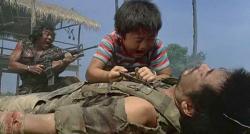
Heroes Shed No Tears
1986 -
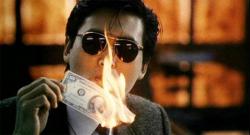
A Better Tomorrow
1986 -
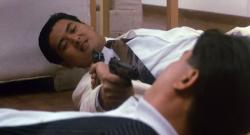
The Killer
1989 -
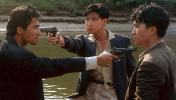
Bullet in the Head
1990 -
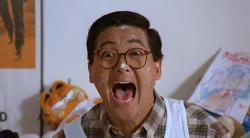
Once a Thief
1991 -
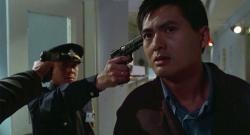
Hard Boiled
1992
We don’t do comments anymore, but you may contact us here or find us on Twitter or Facebook.



